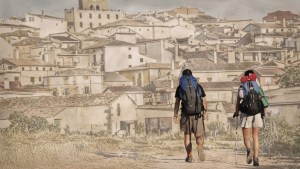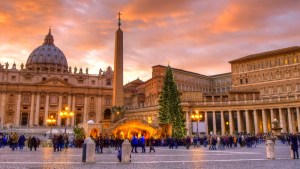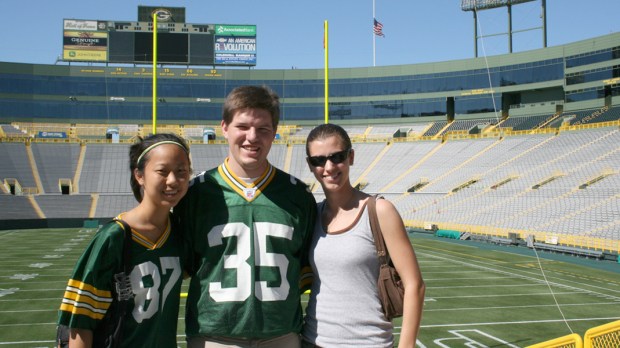This fall we are taking my daughter on college visits, passing through many different areas of the country. Since we were going to be nearby, I thought it would be good to visit the home of our favorite football team, the Green Bay Packers. One of the people we met in south Texas, also a Packers fan, referred to the trip to Lambeau Field as a “pilgrimage.'” Though it can seem flippant, for those of us who follow the Packers, it is indeed a type of pilgrimage to bring ourselves into the physical presence of the site of so many of our heroes and victories, and to be in company horizontally with all Packers fans and vertically with the whole of the Packers tradition.
Pilgrimage is endemic to the human condition. We travel to historical sites, to cemeteries, and to see our favorite performers. More deeply, every religion — with the notable exception of Protestantism — embraces the human need to travel in search of the holy. Indeed, even in the Churches of the Reformation, how many thousands of people have made the journey to the Holy Land, to walk in the steps of Christ Himself? Not even Luther and Calvin could stop the pull of human nature.
Unfortunately, modern western Catholicism has been affected by Protestant disdain of pilgrimage. When paired with the ease of travel, what we do can seem more like religious tourism than the laborious pilgrimages of our ancestors. Yet, even if one takes a car or a plane, the desire for physical proximity to the holy is still there. Catholics still go to Rome or to the Holy Land, even if the means has altered.
While we can point to Mecca for the Muslims, Amritsar for the Sikhs, or the Buddha’s Bodhi tree, pilgrimage takes on a deeper meaning in the Judaeo-Christian tradition. The whole of the Old Testament is a type of pilgrimage. Exiled from Eden, we wander, trying to recover the friendship and amity of God through the sojourn in Egypt, through the desert of Exodus, through the multiple invasions and exiles. All of it is a pilgrimage meant to order the People of God to the most remarkable pilgrim of all: Jesus Christ.

Read more:
Personality quiz: Which pilgrimage should you take?
The Incarnation is the greatest pilgrimage in the history of the universe. God the Father, happy and self-sufficient in Himself, freely sent His Son in the form of a slave (Php 4:4), taking on our flesh and our nature — an immeasurable humiliation — only to suffer and die. It was a pilgrimage because 1) it was a journey that involved sacrifice, 2) it entailed toil and effort, and 3) it was directed to the reconciliation of the sinner with God. The pilgrimage was consummated with the Resurrection and Ascension back to the bosom of the Father.
The Incarnation liberates us from a “spiritualizing” a religion. It is not just enough to be with God in nature or to be a spiritual person. The revolution of Christianity is the divinization of creation itself. All religions are spiritual, but most try to valorize spiritual existence at the expense of the material. Indeed many faiths are simply anti-material. Christianity is aggressively pro-material. Not only did God create the world as good but, by entering into it Himself, He has sanctified every part of bodily existence. As one scholar put it, “Christianity is an affair of things.”
God has willed that we be sanctified by water, oil, bread, wine, even human bodies. We will not be completed in our natures until God raises our bodies on the last day. We are not simply souls, imprisoned in a body or floating in the air. We are body and soul together. This is why the Church wisely incorporates our bodies and all our senses in liturgical worship. We change posture, we sing, are silent, smell incense, hear chant. We change our clothes and demeanor when we enter into the Holy of Holies. Our outward comportment affects and prepares our souls for prayer. We are called to bring ourselves into sanctified places at holy times.
As such, Christians have always tried to place themselves in the presence of the holy, whether into proximity to the Eucharist, or journeying to the dead bodies of the holy ones of God. Similar to the Eucharist, relics set Christianity apart. The dead body we see present in a shrine is the very remains of the one who now beholds God in glory. In a similar, but inferior way than the Eucharist, the saint’s body is the meeting of time and eternity; it is that very corpse which we are infallibly certain will rise in glory on the last day. To see the remains of the saint is truly to say with St. Paul, “Death, where is your sting?” (1 Cor 15:55). People have gone on pilgrimage since the dawn of the faith to affirm this reality.
Like Christ, we too are “strangers and sojourners” (1 Pt 2:11). This is not our home. We live in a “vale of tears” haltingly trying to make our way back to our native land. We are perpetually a “pilgrim Church” as Vatican II calls us (drawing an analogy from Augustine’s City of God). Everything we do marks this journey: our successes, our failures, and our struggles. We should recapture this spirit of pilgrimage, to remind us of our status on earth and to bring ourselves into the presence of the holy. Find your nearest basilica or saint’s shrine, travel to it, and realize one of the deepest roots of our common humanity: the condition of being a pilgrim.

Read more:
How to plan a Christmas pilgrimage to Rome

